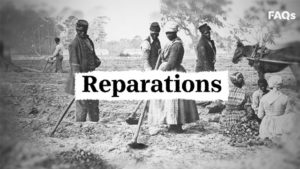 ASHEVILLE, N.C. – In an extraordinary move, the Asheville City Council has apologized for the North Carolina city’s historic role in slavery, discrimination and denial of basic liberties to Black residents and voted to provide reparations to them and their descendants.
ASHEVILLE, N.C. – In an extraordinary move, the Asheville City Council has apologized for the North Carolina city’s historic role in slavery, discrimination and denial of basic liberties to Black residents and voted to provide reparations to them and their descendants.
The 7-0 vote came the night of July 14.
“Hundreds of years of Black blood spilled that basically fills the cup we drink from today,” said Councilman Keith Young, one of two African American members of the body and the measure’s chief proponent.
“It is simply not enough to remove statutes. Black people in this country are dealing with issues that are systemic in nature.
The unanimously passed resolution does not mandate direct payments. Instead, it will make investments in areas where Black residents face disparities.
“The resulting budgetary and programmatic priorities may include but not be limited to increasing minority home ownership and access to other affordable housing, increasing minority business ownership and career opportunities, strategies to grow equity and generational wealth, closing the gaps in health care, education, employment and pay, neighborhood safety and fairness within criminal justice,” the resolution reads.
REPARATIONS: How much would the US owe descendants of enslaved people?
What is systemic racism? Here’s what it means and how you can help dismantle it
Increasing generational wealth should be the focus, supporter says
The resolution calls on the city to create the Community Reparations Commission, inviting community groups and other local governments to join. It will be the commission’s job to make concrete recommendations for programs and resources to be used.
Councilwoman Sheneika Smith, who is Black, said the council had gotten emails from those “asking, ‘Why should we pay for what happened during slavery?'”
“(Slavery) is this institution that serves as the starting point for the building of the strong economic floor for white America, while attempting to keep Blacks subordinate forever to its progress,” Smith said.
Councilman Vijay Kapoor, who has often split with Young and Smith on police and budget issues, said he supported the measure for moral reasons. But he said skeptics could look to the “practical reason”: data showing showing large disparities between African Americans and other Asheville residents.
“We don’t want to be held back by these gaps,” Kapoor said. “We want everyone to be successful.”
The council allowed an hour of public comment on the measure. Many who were not able to speak before the vote waited for another hourlong comment period afterward, pushing the meeting late into the night. Most were in support.
Rob Thomas, community liaison for the Racial Justice Coalition, which led the push for reparations, thanked the council.
“This is a really, really good gesture as far as the foundation of what we can build,” Thomas said. “The potential of what can come out of this document is amazing.”
Increasing generational wealth — something African Americans were deprived of through economic and regulatory discrimination — should be the focus, he said.
It was also important that the county’s government join, Thomas said, to ensure issues weren’t lost between the county and city.
The Buncombe County’s Board of Commissioners is not clearly behind the reparations measure, though it has a 4-3 Democratic majority.
